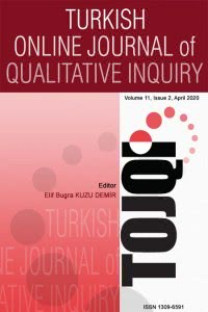Behaviours Disturbing Secondary School Students on the Internet
Bu çalışmanın amacı, ortaokul öğrencilerinin internet kullanırken rahatsızlık duydukları davranışları belirlemektir Araştırma kapsamında Konya ili merkez Karatay ilçesinde 51i erkek ve 42si kız olmak üzere toplam 93 ortaokul öğrencisinden yazılı olarak görüşleri alınmıştır. Görüşleri alınan öğrenciler, 6, 7 ve 8. sınıflarda öğrenim görmekte ve en az bir yıldır internet kullanmaktadırlar. Araştırmanın sonucunda elde edilen verilerin çözümlenmesinde, betimsel analiz tekniği kullanılmıştır. Araştırmanın sonucunda öğrenciler en çok İstemsiz Bildirim ve Sayfalar teması altında görüş bildirmişlerdir. Bu tema altında da öğrenciler en çok Kötü İçerikli Mail Alma , İstemsiz Açılır Pencere-Reklam ve İstemsiz Talep ve Davetler ile ilgili görüş belirtmişlerdir. Ayrıca öğrenciler Zararlı İçerik ve Reklam teması ile ilgili çok sayıda görüş belirtmişlerdir. Araştırma sonucunda elde edilen bulgular, ilgili alan yazın ile karşılaştırılmış ve tartışılmıştır.
Ortaokul Öğrencilerini İnternette Rahatsız Eden Davranışlar
The purpose of this study is to determine the behaviors that secondary school students feel uncomfortable while using the internet. A total of 93 students including 51 boys and 42 girls studying at a secondary school in the Karatay district of Konya province were surveyed by taking their opinions in a written form. Students who were asked for their opinion were studying in the 6th, 7th and 8th grades and had been using the internet at least for a year. At the end of the research, the descriptive analysis technique was used in the analysis of the data obtained. As a result, most of the students reported opinions under the Unintentional Notification and Pages" theme. Under this theme, students expressed opinion the most about "Bad Content Mail Receiving", "Unintentional Pop-up -Ad and "Unintentional Request and Offers". In addition, students stated opinions a lot about the "Harmful Content and Advertising" theme. Obtained findings at the end the research were discussed and compared with the related literature.
___
- Canbek, G. & Sağıroğlu, G. (2007). Computer and internet security for children and teenagers Journal of Polytechnic, 10(1), 33-39.
- Çağıltay, K., Karakuş, T., Kurşun, E. and Tısoğlu, S. (2011). Eu kids online. Retrieved from http://eukidsonline.metu.edu.tr/
- Gürcan, A., Özhan, S. & Uslu, R. (2008). Digital games and their eff ects on children. Turkey Prime Ministry Directorate General of Family and Social Research [Başbakanlık Aile ve Sosyal Araştırmalar Genel Müdürlüğü], Ankara. Retrieved fromhttp://www.ailetoplum.gov.tr/upload/athgm.gov.tr/mce/eskisite/files/DIJITAL_O YUNLAR_ve_COCUKLAR_UZERINDEKI_ETKILERI_RAPOR.pdf.
- Harman, J.P., Hansen, C.E., Cochran, M.E. & Lindsey, C.R. (2005). Liar, liar: Internet faking but not frequency of use affects social skills, self-esteem, social anxiety, and aggression. CyberPsychology & Behavior, 8(1), 1-6. doi: 10.1089/cpb.2005.8.1.
- Livingstone, S. & Bober, M. (2005). UK children go online: Final report of key project findings. 6th London School of Economics and Political Science, London, UK.
- Ministry of National Education [MINE] (2012). Türkiyedeki İnternet kullanımı. Retrieved from http://mebk12.meb.gov.tr/meb_iys_dosyalar/38/14/700710/dosyalar/2012_12/2203252 9_kitapktrkeeski.pdf.
- Şendağ, S. & Odabaşı, H. F. (2006). İnternet ve çocuk: Etik bunun neresinde?, Proceedings of 6th International Educational Technology Conf erence, 1508-1515.
- Torun, Ö. (2007). Resmî ortaöğretim kurumlarında öğrenim gören öğrencilerin internet etiğine ilişkin algılarının incelenmesi (Unpublished master thesis). İstanbul: Marmara University, Institute of Educational Sciences.
- Tuncer, N. (2000). Internet use by children, Turkish Librarianship, 14(2), 205-212.
- TurkStat (2012). Hanehalkı bilişim teknoloj ileri kullanımı araştırması. Retrieved from http://www.tuik.gov.tr/PreHaberBultenleri.do?id=10880.
- Yıldırım, A. & Şimşek, H. (2005). Sosyal bilimlerde nitel araştırma yöntemleri (5th ed). Ankara: Seçkin Yayıncılık.
- ISSN: 1309-6591
- Başlangıç: 2010
- Yayıncı: Prof.Dr. Abdullah Kuzu
